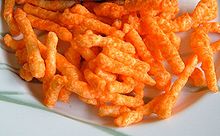Junk food: Difference between revisions
| Line 45: | Line 45: | ||
* [http://demonstrations.wolfram.com/JunkFoodMolecules/ Junk Food Molecules] by Abigail Nussey, [[The Wolfram Demonstrations Project]]. |
* [http://demonstrations.wolfram.com/JunkFoodMolecules/ Junk Food Molecules] by Abigail Nussey, [[The Wolfram Demonstrations Project]]. |
||
* [http://snackertainment.com International Junk and Snack Food Review |
* [http://snackertainment.com International Junk and Snack Food Review |
||
* [http://www.pie.com A website devoted to pie (credit to graeme smith and chris lissaman for it's discovery!] |
|||
[http://www.pie.com link title] |
|||
[http://www.mcdonalds.com |
[http://www.mcdonalds.com McDonalds official website] "macdonalds is really really good!" said the fatman. |
||
[[Category:Snack foods]] |
[[Category:Snack foods]] |
||
[[Category:Fast food]] |
[[Category:Fast food]] |
||
Revision as of 21:46, 30 November 2008
This article needs additional citations for verification. (August 2008) |

Junk food is an informal term applied to some foods with little or no nutritional value, or to products with nutritional value but which also have ingredients considered unhealthy when regularly eaten, or to those considered unhealthy to consume at all. The term was coined by Michael Jacobson, director of the Center for Science in the Public Interest, in 1972.[1]
Factors contributing to labeling as junk food are high levels of refined sugar, white flour, trans fat and saturated fat, salt, and additives such as preservatives and coloring agents. Others include lack of proteins, vitamins, fiber and other nutrients for a healthy diet.
Some fast food is popular because it is inexpensive and resistant to spoilage. These products may also be popular with consumers because they are widely available, require little preparation, and are easy or especially fun to consume. Junk food is associated with health problems including obesity, heart disease, Type 2 diabetes and dental cavities. Problems with fast food may not be apparent to children, hence advertising aimed at children has come under criticism.[citation needed]
Classification
What constitutes junk food may be confusing and, according to critics, includes elements of class snobbery, cultural influence and moral judgement.[citation needed] For example, fast food in North America, such as as hamburgers and french fries from companies like McDonald's, KFC and Pizza Hut, are often perceived as junk food, whereas similar meals supplied by more up-market outlets such as California Pizza Kitchen or Nando's may not be, despite often having the same or worse nutritional content.[1] Some foods that are considered ethnic or traditional are not generally considered junk food, such as falafel, gyros, pakora, gyoza or chicharron, though these have little nutritional value and are usually high in fat from being fried in oil.[citation needed] Other foods such as white rice or roast potatoes[citation needed] are not considered junk food despite having limited nutrients compared to whole grain foods. Similarly, breakfast cereals may be regarded as healthy, but may have high levels of sugar, salt and fat.[2]

Some chips or crisps may be harmful because they may contain saturated and trans fats. The detrimental effects "empty calories" may outweigh the benefits of the unsaturated fats[citation needed]. Junk foods may be high in sodium, which causes blood pressure to be temporarily higher; this may be a health risk for people who already have high blood pressure.
In the United Kingdom, the Food Standards Agency (FSA) does not use the term "junk food", and describe food as "HFSS" (high fat, sugar or salt) instead, based on a nutrient profiling model[3]. They state that "HFSS foods can form part of a balanced diet, but research shows that children's diets contain too much fat (especially saturated fat), salt and sugar, and not enough fruit and vegetables."[4]
Marketing
During 2006, in the United Kingdom, following a high profile media campaign by the chef Jamie Oliver and a threat of court action from the National Heart Forum[5], the UK advertising regulator and competition authority, Ofcom, launched a consultation on advertising of foods to children.[6] The Food Standards Agency was one of many respondents.[7] As a result, a ban on advertising during children's television programs and programs aimed at young people was announced.[8] The ban also includes marketing using celebrities, cartoon characters and health or nutrition claims.
Pregnancy
'You are what you eat', but in fact it may also be true that you are what your mother ate
— Dr Stephanie Bayol, Royal Veterinary College
Eating a poor diet when pregnant or breastfeeding may cause long-lasting health damage, according to child, animal studies by the Royal Veterinary College and London's Wellcome Trust. The offspring of rats fed fatty, processed food had high levels of fat in their bloodstream and around major organs even after adolescence, animals had a raised diabetes risk, even if they ate healthily.[9]
See also
Super Size Me, a documentary film about junk food
References
- ^ a b O'Neill, Brendon (2006-11-27). "Is this what you call junk food?". BBC News. Retrieved 2006-11-27.
- ^ "Poor nutrition in cereals exposed". BBC News. 2004-03-31. Retrieved 2006-11-28.
- ^ "Nutrient profiling". Food Standards Agency. 2005. Retrieved 2008-04-02.
- ^ "Key Facts". Food Standards Agency. 2007-04-01. Retrieved 2008-04-02.
- ^ The Guardian (Felicity Lawrence) Heart campaigners drop case over junk food ad ban 22 June 2006
- ^ Television advertising of food and drink products to children - Options for new restrictions
- ^ Food Standards Agency Board responds to Ofcom consultation
- ^ "Junk food ad crackdown announced". BBC News. 2006-11-17. Retrieved 2006-11-28.
- ^ "Mother's junk food 'harms child '". BBC. Retrieved 2008-07-01.
{{cite news}}: Cite has empty unknown parameter:|coauthors=(help)
External links
- Junk Food Molecules by Abigail Nussey, The Wolfram Demonstrations Project.
- [http://snackertainment.com International Junk and Snack Food Review
- A website devoted to pie (credit to graeme smith and chris lissaman for it's discovery!
McDonalds official website "macdonalds is really really good!" said the fatman.
